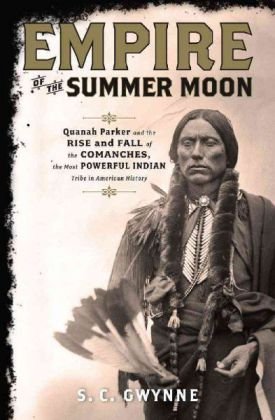Today I'm looking at another book about Comanche history, Empire of the Summer Moon, by S.C. Gwynne. Some of my long-time readers may remember a lifetime ago when I looked at another book, Comanche Empire, and while I quibbled over the use of the term ''empire'' for what appeared to be a band of similar nomadic ethnic groups that exerted military and economic control over a vast geographic area, but I thought that Hamalainen did a pretty good job with their arguments. In Empire of the Summer Moon, however, Gwynne uses outdated methodology that reveals an underlying racist ideology which brings his whole work into question. The focus on Quanah Parker, who some people might suggest was a collaborator, further leads me to suspect this book isn't worth the effort of reading.
I know that in the last paragraph I made some pretty serious charges, but I think this is entirely justified by Gwynne's use of the terms ''primitive'' and ''civilized''. Without going into a huge lecture, basically the social sciences (history, sociology, anthropology, etc.) basically avoid using the terms primitive and civilized to describe people, societies, nations, etc. This is because the terms primitive and civilized, especially in how they were used in the nineteenth century to justify colonization and imperialism, come with inherent moral baggage. Civilization is good, primitiveness is bad and needs to be countered with the force of civilization. We're even at a point where using simple and complex to describe societies is debated because a society that appears simple may in fact be rather complex, depending on how one wishes to use the term.
At multiple points through the book, Gwynne uses the terms primitive to describe the Comanche people and pits them in conflict with white civilization. I remember two specific examples that stuck out for me. First was when Gwynne briefly talked about Comanche language he said that despite its primitive nature, it had extremely detailed descriptions of horses, such as a yellow horses with black hair and a black tail, a horse with red ears, a horse with white ears, and so on. To which I reply, of course the Comanche don't have words for concepts like plumbing or income tax. They're a nomadic hunting culture where horses are central to their way of life. Where their language is going to get precise and sophisticated is with horses, not with concepts they have no use for. Comanche language can be complex without necessarily talking about abstract ideas.
Another example is when Gwynne talks about the Comanche response to diseases such as cholera, smallpox, and syphilis which they had no previous experience dealing with. He dismisses their traditional medicine as ''primitive'' which would have had no effect on the underlying disease. Again, this is an assumption that native people are automatically primitive and white people are somehow advanced. I would like to point out by our modern standards at the time the Comanche were dealing with these illnesses, the 1850's, Western medicine was equally primitive, or perhaps even more harmful. The Comanche may not have been able to do anything about syphilis, but at least they weren't treating it with mercury pills.
On top of this, Gwynne seems to get invested in the idea of the Comanche as a warrior people. I will admit that the Comanche were extremely well trained as mounted archers, but considering their livelihood was hunting the American bison, it makes sense that they would get very, very good at mounted archery just as a matter of survival. Gwynne seems to take especial pleasure in describing the torture, murder, abduction, and rape carried out by Comanches against white settlers. While this is certainly a thing that happened, I find it frustrating when Gwynne literally glosses over the Sand Creek Massacre by merely saying that ''what happened is too terrible to speak about in detail''. To go into detail about Comanche atrocities while largely ignoring the extensive, systemic, and documented atrocities as part of the genocidal campaign of the American government does a great injustice to the cause of Native American history to merely pass over this. Coupled with his usage of the terms primitive and civilized leads me to think there is a far more racial bias in Gwynne's work.
All of this leaves me to look somewhat askance and Quanah Parker's inclusion in the book. As Gwynne depicts it, Parker seems the most responsible for encouraging the Comanche to settle on a reservation and adopt white ways of life. Because of the racial overtones in Gwynne's work, and the positive light in which Parker is depicted, I almost come to the conclusion that Parker was a collaborator with the white government in betraying his people. I don't know what the current Comanche people think about Parker, but Gwynne certainly leaves me with doubts.
Overall I would not recommend this book. Gwynne's mythology is flawed and he uses racial tones within his writing. Considering this book was written in the last ten years, that raises some serious red flags for me. If you're looking for a book about the Comanche, I would definitely go with Comanche Empire instead.
- Kalpar


No comments:
Post a Comment